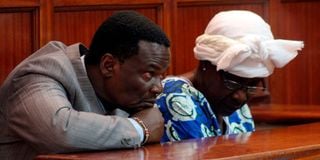
Sirisia MP John Waluke (right) and his associate Grace Wakhungu during a past court session.
Sirisia MP John Waluke and his one-time business associate Grace Wakhungu have been cleared of all the corruption-related offences that had earned them jail terms or hefty fines from two courts.
Mr Waluke escaped a jail term of 67 years and will now serve his parliamentary term unhindered after the appellate court cleared him of the charges while Ms Wakhungu can rest easy after her 69 years imprisonment was quashed by the same bench.
When jailing them in 2020, trial magistrate Elizabeth Juma had given them to option of paying a fine in excess of Sh1.5 billion.
But on Friday, two Court of Appeal judges said after analysing the trials done earlier, the duo should not be considered offenders.
The overriding question from the court was: If someone gets money due to an order from a court, how can that process be considered corruption?
The bench was, however, divided as Justice Abida Ali-Aroni, declined to sign the verdict. The viewpoints of Justices Milton Makhandia and Patrick Kiage, however, carried the day.
“The appellants shall forthwith be set at liberty unless otherwise lawfully held,” stated the judges.
The Court of Appeal judgement also seemed to touch Mr Waluke with a soft brush, with the judges saying he only played a “dormant” role in the company whose dispute with a government agency led to the criminal case.
The judges also noted that there was no evidence that the lawmaker received the disputed monies in the case.
“The amount had only been deposited with the advocates [of the company where Mr Waluke was a co-director],” they stated.
“There was no evidence that he received money in all the counts relating to the acquisition of public property.”
Judges’ viewpoints on the case are split because of how the case started.
The year was 2004. Erad Supplies and General Contracts Limited, where Mr Waluke and Ms Wakhungu were directors, won a tender to supply 40,000 metric tonnes of white maize. The tender was floated by the National Cereals and Produce Board (NCPB).
As pleaded in court, NCPB was to issue a letter of credit after the contract was signed but did not. Therefore, the company did not proceed with the importation of the maize.
Erad Supplies considered NCPB’s conduct a breach of contract and took the matter to an arbitrator. The arbitrator found NCPB to be in breach of contract and awarded $1.96 million (Sh252.98 million) for loss of profit and $1.146 million (Sh147.91 million) for storage. This amounts to around Sh400.89 million on today’s rates.
Dissatisfied, NCPB went to the High Court, where it insisted that Erad Supplies forged the invoice for storage charges. The High Court refused to quash the award.
NCPB then went to the Court of Appeal. It did not succeed there either.
Armed with the verdicts, Erad Supplies went after NCPB’s assets and finally got a garnishee order through which it obtained money from NCPB’s accounts.
This is when the Ethics and Anti-Corruption came into the picture, and in August 2018, it saw the arraignment of Mr Waluke and Ms Wakhungu.
Using a false invoice was the first count. The court heard that the two “uttered a false invoice No. 12215-CFErad for the sum of $1,146,000 to NCPB purporting it to be an invoice to support a claim for costs of storage of 40,000 metric tons of white maize purportedly incurred by Chelsea Freight.”
Twenty-seven witnesses gave their testimony and it led to the conviction of the two in 2020. The conviction was a rarity because it came at a time when Mr Waluke was in office. Equally, the hundreds of millions they were to pay to avoid going to prison were considered earth-shattering. Mr Waluke was required to pay at least Sh628.9 million.
They then went to the High Court and Justice Esther Maina saw no reason to interfere with the sentences they were given.
That is how they found themselves in the CoA. The ruling delivered yesterday was heavy on pointing out the mistakes made by the lower courts, among them that Justice Esther Maina did not re-examine the trial as is required.
“It (the High Court) fell short of proper analysis and contextualization of the evidence. The fresh analysis was not based on the particular elements of the offences charged and was flippant, or perfunctory, to say the least,” the appellate judges ruled.
The judges also took issue with the fact that the payment of the monies in question was done because of court orders. Because the case had been heard by the High Court and the Court of Appeal, the bench observed, the magistrate who handled the matter should not have taken the direction she did.
“The said judgments were binding on the trial magistrate who was handling the case in the first instance,” wrote the judges.
“The Chief Magistrate’s Court was therefore bound by the decisions of the High Court as pertains to the transaction given that the criminal case was as a result of payment sanctioned by the courts and where the issue of allegedly forged invoice was extensively addressed and resolved.
“It does appear to us that after NCPB failed all the way to impugn the award in civil proceedings turned to EACC to invoke criminal sanctions against the appellants to achieve the very purpose it had been denied in civil proceedings going by the import of the sentences imposed. This appears to us as the worst form of abuse of the criminal process. It was obviously undertaken for ulterior motives, not for bona fide vindication of any rights,” the appellate court noted.
They further charged: “Judgments of courts remain final and binding on all courts below them. They must be deferred to notwithstanding any misgivings that other judges and judicial officers may have, and quite irrespective of the noble aims that may tempt them to do otherwise.”
At the Court of Appeal, Mr Waluke was represented by Otiende Amolo, Elisha Ongoya and Melisa Ngania while Ms Wakhungu had Paul Muite and Duncan O’Kubasu as her counsel. Erad Supplies was represented by Mr Kangogo Kechem.
During the hearing of the appeal in April, the two accused raised the issue of payments with the blessing of courts.
Said Mr Muite: “There can be no case of fraudulent acquisition arising from an order of the court, which has not been set aside or overturned. If the appellants had gone to River Road and created a fake order, this would be the case.”
The court also heard that there were material inconsistencies that undermined the prosecution’s case and maintained that the business transaction was purely a commercial and the claims were civil in nature, hence there was no criminal culpability.
Additional reporting by Richard Munguti









